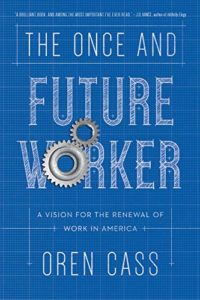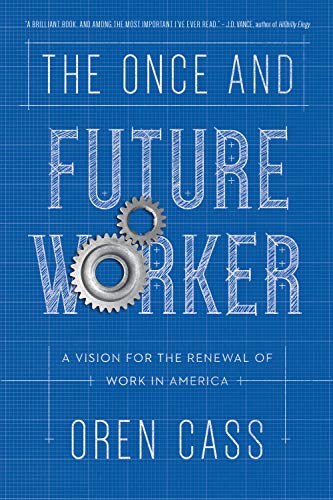 This article is the first in a new EIG Authors Series in which we explore policy issues and ideas with experts from across the ideological spectrum. In this inaugural piece, EIG’s John Lettieri speaks with the Manhattan Institute’s Oren Cass to discuss his new book, The Once and Future Worker: A Vision for the Renewal of Work in America. In his book, Cass explores an American worker in crisis, and re-evaluates American society, economics, and public policy implications. Follow Cass on Twitter at @Oren_Cass.
This article is the first in a new EIG Authors Series in which we explore policy issues and ideas with experts from across the ideological spectrum. In this inaugural piece, EIG’s John Lettieri speaks with the Manhattan Institute’s Oren Cass to discuss his new book, The Once and Future Worker: A Vision for the Renewal of Work in America. In his book, Cass explores an American worker in crisis, and re-evaluates American society, economics, and public policy implications. Follow Cass on Twitter at @Oren_Cass.
Note: The views below do not necessarily reflect the position of EIG.
Who exactly is the “once and future worker”?
The book is about the role of the worker in our society—how we understand and value him or her, and how our public policy and culture either elevate and strengthen him, or do the reverse. America’s prosperity was built on a foundation of workers who could support strong families and communities and through those institutions raise the next generation to do even better. Certainly, we have too much nostalgia for how work looked in the past and we shouldn’t expect it to look the same in the future. But we are also much too pessimistic about work’s ability to play a comparable role in the future, however the economy evolves. And we’re caught in a present where we stopped caring about work and are now paying the price.
Have we really stopped caring about work? It seems like work and wages and “good jobs” are central to our politics and our culture on all sides.
Yes and no. Certainly, everyone emphasizes “good jobs,” but I would argue that the priorities reflected in actual policy agendas say a lot more than what politicians say. For instance, go back and look at Hillary Clinton’s speech at the Democratic National Convention in 2016. She said her mission was more good jobs. And then she reeled off a list of bullet points that was completely irrelevant to the purported goal, or even counterproductive. More regulations to drive up the cost of employment, more entitlements, health care, climate change… what a coincidence that the exact agenda she would have without concern for work was also her jobs agenda.
Republicans don’t do much better. Their view is that if we just let the market work, it will automatically generate the things we want. So cut taxes, reduce regulations, and voila—good jobs. We have an awful lot of empirical evidence at this point that A does not necessarily lead to B. And, further, if good jobs were really the goal is that all you’d do?
The policy agendas are a microcosm of the broader cultural shift we’ve seen over the past 50 years to an almost exclusive focus on people’s identities as consumers. It sounds strange to talk about the competing interests of workers and consumers because it’s not really different interest groups vying for power, it’s two sides of the same coin. People are both workers and consumers. But the things that are good for you as a worker aren’t necessarily the ones that are good for you as a consumer.
We’ve turned the dial all the way to the “consumer” side, but when it has come at the expense of people’s success as workers—their ability to find good jobs that allow them to support their families and communities—the results have been disastrous.
You argue that, “the problem is not so much that public policy has failed as that it has succeeded at the wrong things.” What do you mean by that?
We’ve been obsessing for a generation over the so-called “economic pie”—just keep growing the economic pie, and everyone can have more. And if you get a small slice, well we can just take some pie off someone else’s plate and give it you.
If all you care about is how much pie you get to eat—that is, how much you get to consume—then this in fact works. And it did work! It seems like everyone has an iPhone. Consumption and material living standards have been skyrocketing, even for the poor. I think a lot of policymakers and politicians and economists are genuinely puzzled that people aren’t happy with the result, and that instead we’re seeing a social unraveling and a populist backlash.
The reality, which the economic models missed, is that consumption is all well and good—I love my super-cheap flat-screen TV—but it’s not the basis for a healthy society. Our ability to be productive is much more important to our life satisfaction and to our ability to form and support strong families and communities. And those families and communities are the key to raising the next generation. Policies geared entirely toward economic growth and redistribution not only ignored that virtuous cycle, they actively inhibited it, and now we’re seeing it break down. It’s an unsustainable economic model.
You don’t usually hear “sustainability” talked about the way you describe in the book.
Everyone thinks about sustainability in environmental terms, but the concept is much broader than that. Ultimately, it’s about whether the things you are doing are preserving the endowments that will allow you to do them again in the future. That comes up a lot with respect to the environment and natural resources: are we using things up, or doing permanent damage that will prevent future generations from enjoying them? Those are important questions, but we’ve discovered over the years that technological progress and economic growth are quite helpful in making activities sustainable that at first glance might seem unsustainable. For instance, we worried that we were going to run out of oil at the rate we were using it. But a wonderful thing about markets is that if a resource becomes scarce, its price rises, inducing investment to either find more of the resource or find alternatives. That’s what has happened. Currently we have more oil than ever, and we can develop electric cars too.
Social endowments pose a parallel challenge. The productivity of our economy and our enjoyment of life depend enormously on our ability to work productively, to form families, to participate in communities, and so forth. If we erode those endowments by embracing an economic model and a culture that disregards the importance of work, we leave the next generation in a far worse position, leading to further erosion. But unlike with natural resources, no amount of technological innovation is going to fix that, no level of GDP is going to make up for it. So genuine, durable prosperity has to be built on an economic system that preserves those endowments, which means attending to everyone’s role as a producer instead of just ensuring everyone has enough pie to consume.
What is the path forward?
I want us to focus on the labor market.
Everyone understands the stock market, with prices scrolling by on a ticker, or the supermarket, with produce labeled in bins. The labor market is a market too—it’s the market for people’s time and the work that they can do. So it’s important to keep in mind that while we think of employers providing jobs, it’s actually workers who provide something in the labor market and employers who buy it. A job is our word for an ongoing transaction that benefits both sides.
The labor market determines what types of jobs exist, where they are located, how many of them, and at what pay scale. This is a crucial point: a market isn’t inherently a good one or a bad one, it’s just a neutral mechanism. It takes the conditions you present it with, and produces some outcomes. The Right gets it wrong when it says “markets are good, so whatever outcome we get is the best outcome,” full stop, and the Left gets it wrong when it says “I don’t like this market outcome, I will try to command a different one.” That’s a really good way to mess up a market and get a worse outcome.
The right thing to do is to look at the conditions. If we want different results, we need to change the conditions the market operates within. Thinking in those terms invites us to reevaluate lots of different policies. For instance, we have to ask how to get more demand for the kinds of work—often industrial work—that less skilled workers can do most productively. One way to do that is with less stringent environmental controls. We have to ask how we can prepare more people, most of whom still don’t earn even a community college degree, to succeed in the labor market anyway. Immigration and trade policy both have to be about how we draw boundaries around our economy—who do we let supply work in the labor market? We have to rethink organized labor, to open up a broader scope for the kinds of agreements workers and employers can make. And I think we have to consider subsidizing wages directly. If we want to see the market to produce more jobs at higher wages, we could just, you know, pay for that.
Many people would not think of that as a traditionally conservative idea. Where do you see ideas like these falling on our political spectrum?
Everyone has forgotten the meaning of conservative. What we call conservative economic policy in America today is almost entirely libertarian. It’s the free market above all, as an end unto itself. Certainly, conservatives like markets too. And conservatives and libertarians have found common cause defending markets against dangerous assaults, up to and including outright communism. But for conservatives, markets are a means to the greater end of a stable and flourishing society, which we believe requires strong social institutions. At the point where free markets are harming that objective instead of contributing to it, we have to part ways with the libertarians.
I think that distinction helps to explain some of the turmoil in the Republican Party today, among both voters and leaders. You have a coalition breaking apart, and people who assumed they saw things the same way have discovered they have different perspectives and priorities. You have some people saying, “if there are no jobs in your community, stop complaining and move to Houston.” Other people think that’s absurd and advocate for maintaining and strengthening local communities even when it’s not the most economically efficient outcome in the short run. Our policy needs to attend to those kinds of concerns.
Moving to opportunity has always been part of the American tradition, and it can be a great solution for some people. On the other hand, not everyone is able to move or wants to move. How should regions evolve with the economy?
Iowa’s population climbed every decade from the 1880s to the 1980s, even as we entirely mechanized farms. Populations in Oklahoma and Kansas stayed relatively steady, even during the infamous Dust Bowl. It’s just not true that we have ever addressed economic challenges by having everyone move out. While a lot of very well-educated and economically mobile people take for granted that they move across the country for work, the typical American adult still lives less than 20 miles from Mom.
A lot of people say that the decline in geographic mobility explains our economic challenges, but I think that’s backward. We are seeing a lack of mobility in part because of our economic challenges. Moving away is hard. It takes a strong family and social network, confidence, skills, resources—all the things that people in depressed regions now lack access to. So by all means we should welcome geographic mobility, but our economic formula also needs to be one that supports prosperity in all kinds of places.
It’s also worth noting that this suggestion that people move away from their homes and families is a quintessential example of a bigger problem, which is that all of our policy solutions that are supposed to help people who have been left behind ask them to make all the sacrifices while the people who are doing great don’t ever have to make any.
It seems like you’re describing the need to jump to a new and improved labor market equilibrium. Can we get there without a wholesale revamp of our education and workforce training systems?
I do think a revamp is necessary. But it needs to occur in our goals as much as our systems. We have built an education system oriented almost entirely toward delivering college graduates. Nearly all of our resources go toward preparing K-12 students for higher education and then financing it. Nearly all of our reform efforts go toward doing that better. But we are failing most students—the pipeline moves perhaps a fifth smoothly from high school to college to career. And if you don’t make it, we typically have little for you besides a shrug and a “sorry.”
Our focus needs to be on the majority of students who are not going to be college graduates. We need to create a non-college track that gets every bit as much investment as the college track does, even though it would look very different. By eleventh grade those students should be getting on-the-job experience and technical training. For what we spend on a college student, we could offer an alternative that gets someone to age 20 with years of work experience, an industry credential, a good job, and a savings account for further training.
But doing this well is going to require an acceptance that college prep isn’t our top priority, and also an acceptance that a less academically-intensive education that leads to a well-paying job is just as worthy of our respect and support. The kids who are going to succeed on the college track are the ones who are likely to be the “winners” in our economy. We owe them our encouragement, but our resources need to be focused elsewhere.
One of the most striking messages of the book, which comes through as you talk about these topics like environmental or education reform, is the idea that redistribution can and should come in non-monetary forms. Can you explain what you mean by that?
For a long time in this country, the political debate has been over how much to tax and spend. Whoever was willing to write the biggest check got to claim the mantle of compassion. I always like to cite Joe Biden, “Don’t tell me what your values are, show me your budget and I’ll tell you what your values are.”
That’s just wrong. Taxing and spending is easy. Taxing someone richer than you are and spending is even easier. Borrowing from future generations and spending is easiest of all, and of course that’s what we’re doing. A bigger handout isn’t what people need or want right now anyway. A bigger handout doesn’t solve the problem of work.
What we’ve done is to build a society oriented entirely toward the needs and preferences of highly educated people. We’ve created the conditions for a labor market in which those people do really well. If you go back to that list of policy areas I mention in this book for altering labor market conditions to create more of the jobs we need, they were mostly areas where the people who are thriving would have to make concessions for the sake of others. The high schools that operate as free prep schools for upper-middle-class families are not the ones that are going to equip kids who will never succeed in college to earn $20 an hour by the time they’re twenty. The trade and immigration policies that benefit corporate managers are not the ones that benefit people competing with foreign workers and low-skilled immigrants.
No one likes to hear they should make sacrifices, but I think what society’s prospering segments are discovering is that in a democracy, a miserable majority is everybody’s problem. It all comes back to that idea of sustainability. In the short run, whatever seems most efficient, whatever yields the biggest pie, seems like the obvious choice. But if we take a longer view, I think it becomes obvious that building a labor market that works for everybody has to be our top priority.






